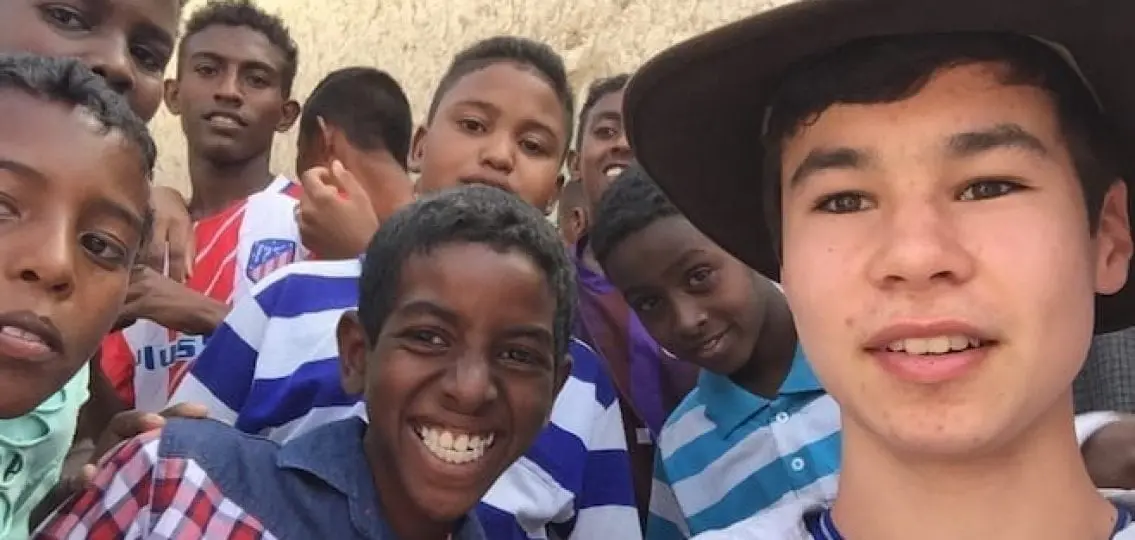A couple of years ago, I brought my 11-year-old daughter with me to El Kurru, the archaeological excavation I work at in Sudan. For two weeks we traveled together, interacted with members of the dig, and sat next to each other at group meals. At the end of the trip, I felt closer to her than ever, and we still share fond memories of the experience.
This year, my son came with me to El Kurru. At fifteen, he was more mature than his sister, more cautious, and — as a hungry teenaged vegetarian — more concerned about food availability. Dad jokes had gone from eliciting laughs to wry smiles, and now, eye rolls.
I looked forward to bonding with him in Africa.
Father And Son Bonding, Or Maybe Not
From the start, things were different, however. The dig house — a home we rented for two months from a local family — had a fresh coat of paint. On my last trip, I cautioned my daughter not to wander around because the mudbrick walls around every family compound rendered the entire area in a nondescript brown.
Now, the dig house was the only structure in the village that was… pink.
“Think you could find your way back here?” I asked my son.
His response: eye roll.
But the color of our residence wasn’t what set the trips apart.
The first night, after dinner, the kids in our landlord’s family invited my son to play soccer in their courtyard. I was happy that he immediately made some friends, but wished he was around to share in the evening conversation with my archaeologist colleagues.
In the morning, while I photographed objects for publication, two conservators borrowed my son for an extra pair of hands. Together they rolled out and cut some gardening fabric to protect and preserve the burial chamber of a Nubian queen mother.
Another day, when I made measured drawings of pots and inscribed scarabs, I wanted to show my son what I was doing and why; but he was a few miles away with my Danish friend Tim, picking up all the surface finds within a four-meter radius.
It’s an important job. The surface pick-up would serve as a baseline measurement of human habitation to gauge where we might find areas to dig in the future. I’ve known the taciturn Tim for 20 years, and while I consider him a friend, I usually only get about five sentences from him in a season.
Father And Son Relationship: More Separate Than Ever
This year one of them was, “Your son is a hard worker; he could be a good archaeologist.” I felt a surge of pride tempered with disappointment that I wasn’t there to witness his work.
One afternoon, I found my son discussing Catalonian independence with the two Spaniards on our team. Catalonia was the topic at my son’s debate tournament a few months ago, and he impressed the gentlemen with his knowledge.
“My nephew is about the same age,” Luis told me. “He lives in Spain and doesn’t know as much as your son. My nephew is a — how you say? — jerk?”
The “jerk” nephew probably knew more about Catalonia than I did, so I just stood nearby and listened to the conversation, contributing nothing.
My plan had gone awry. We weren’t bonding. In fact, I felt more separate from my son than ever.
Then I took a deep breath and allowed myself to acknowledge that my kids were in much different places in their lives when they came to Sudan.
Letting Go
My tween daughter, an introvert, enjoyed the shared living space with intelligent adults who appreciated the quirky comics she drew.
My extroverted son took advantage of going farther afield, making new friends from different continents.
I expected my trip with my son to be the same as my daughter, but it wasn’t.
For one, it was about holding on together; for the other, it was about letting go.
With my mature 15-year-old, I wasn’t metaphorically “driving the bus” on this trip. Instead, I handed my son a ticket and watched where he ended up each day. I wasn’t there to experience every stop, but merely to offer some words of guidance and opportunities to explore.
And somehow, we still grew closer.
My role was different with my son, but equally important. I was there to help him relive each new experience.
He told me about visiting the local Sudanese school and watching a pre-school “graduation.” He explained what the conservators were doing in the tomb. He shared that he was proud when he was the only one to spot bits of ancient bronze nails at the surface pick up.
When we came back to the States, we went out to dinner with his grandparents.
“What did you do in Sudan?” they asked him. He looked over to see what I would say.
I shrugged. It wasn’t my story they wanted to hear.




